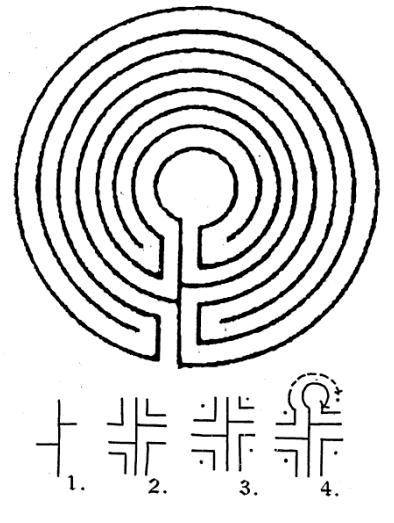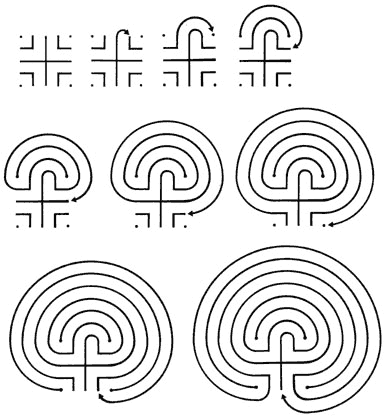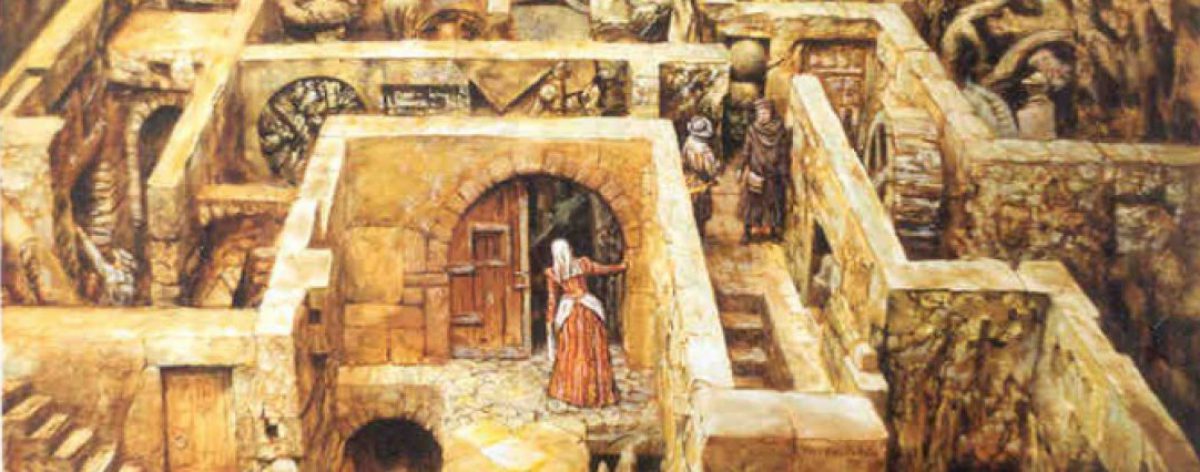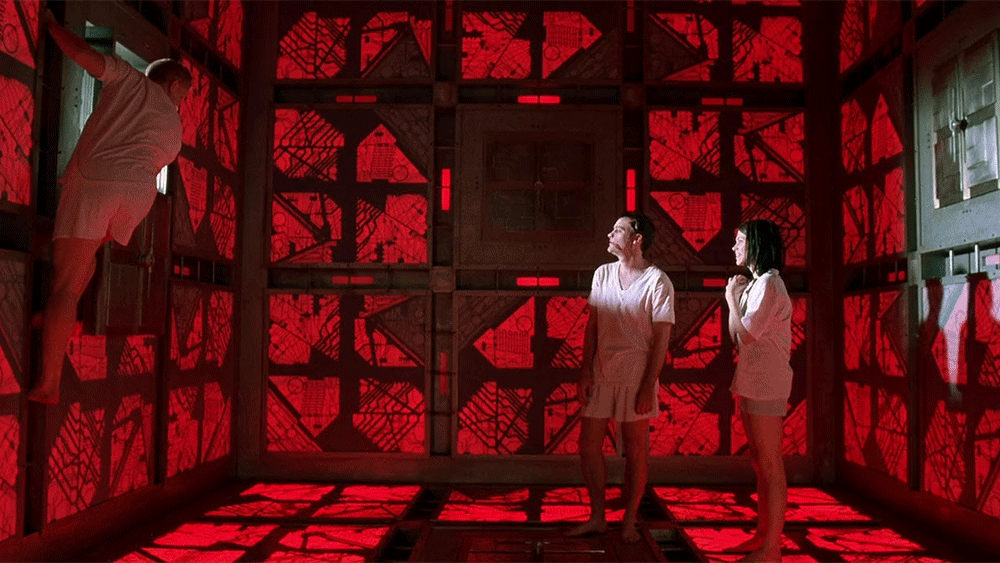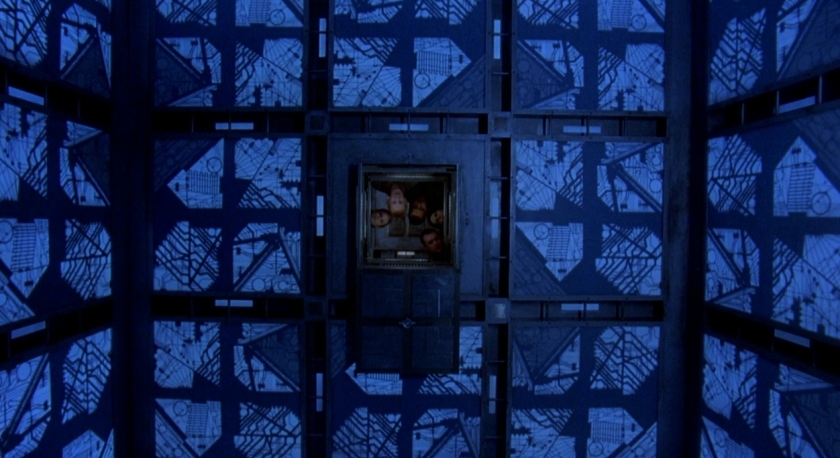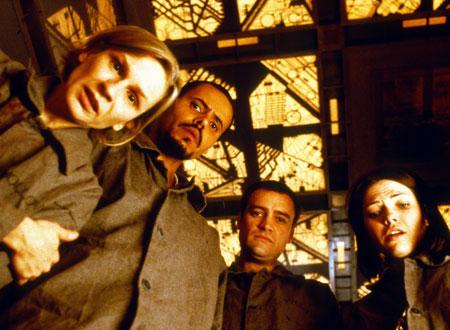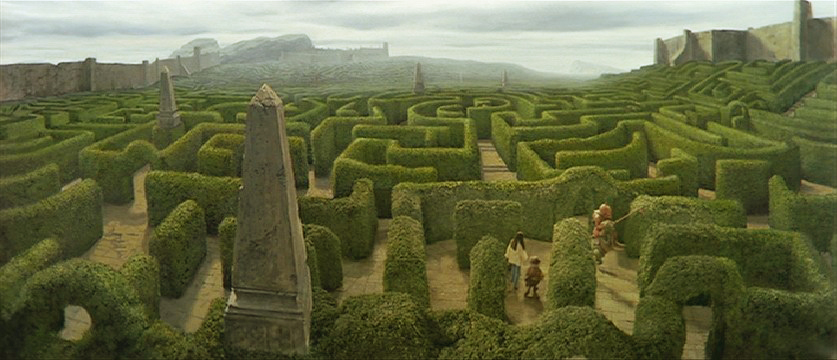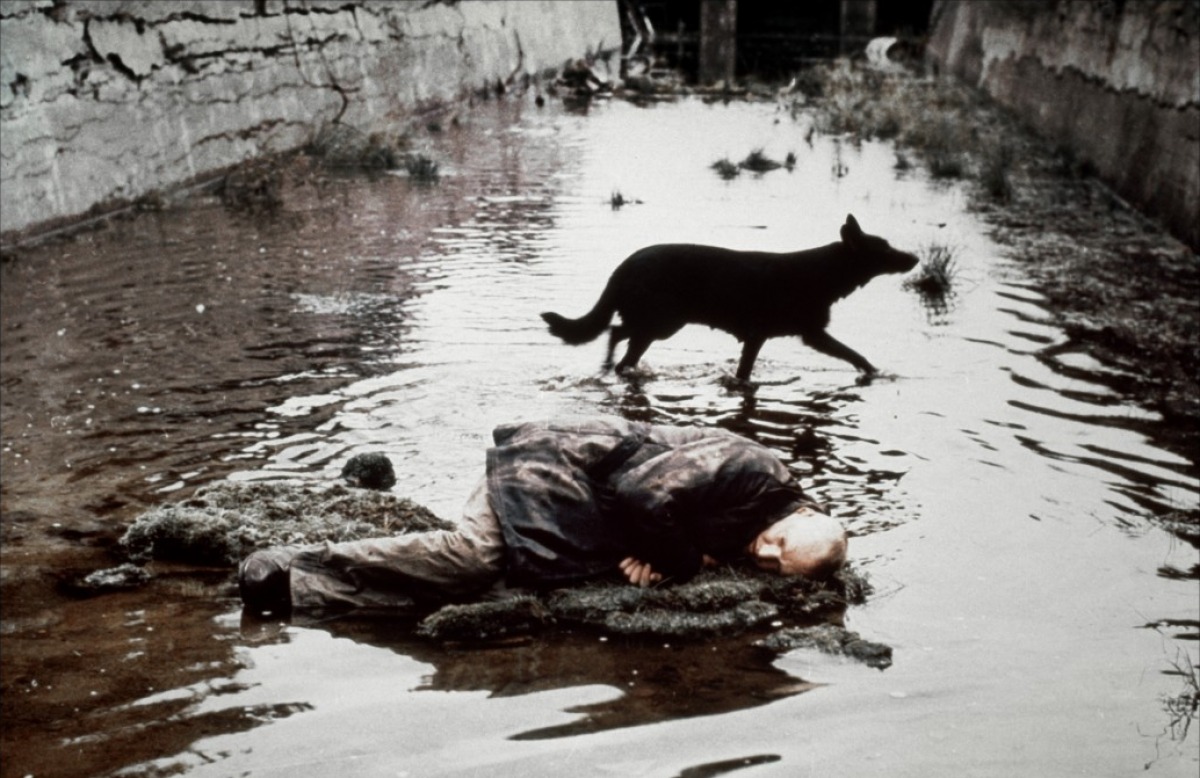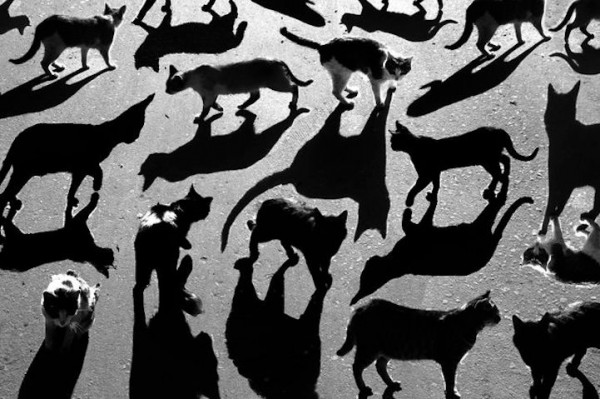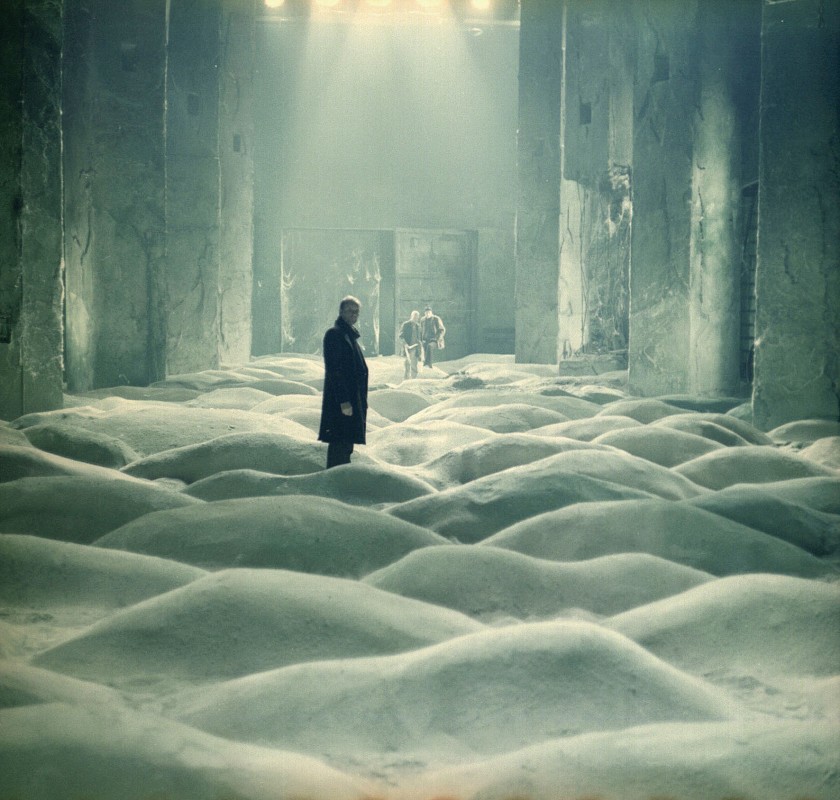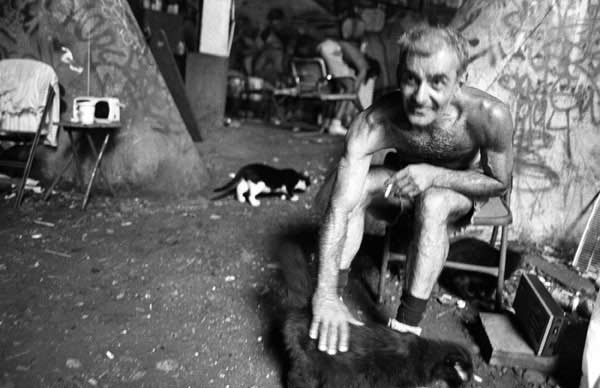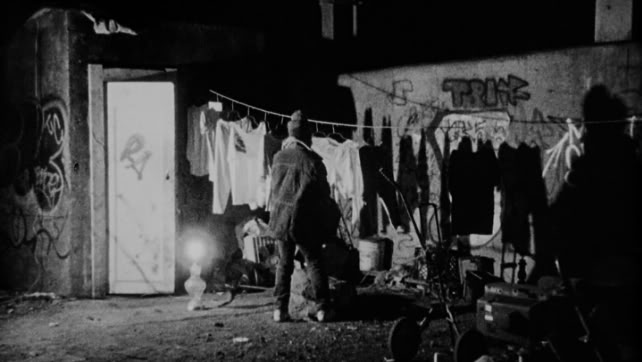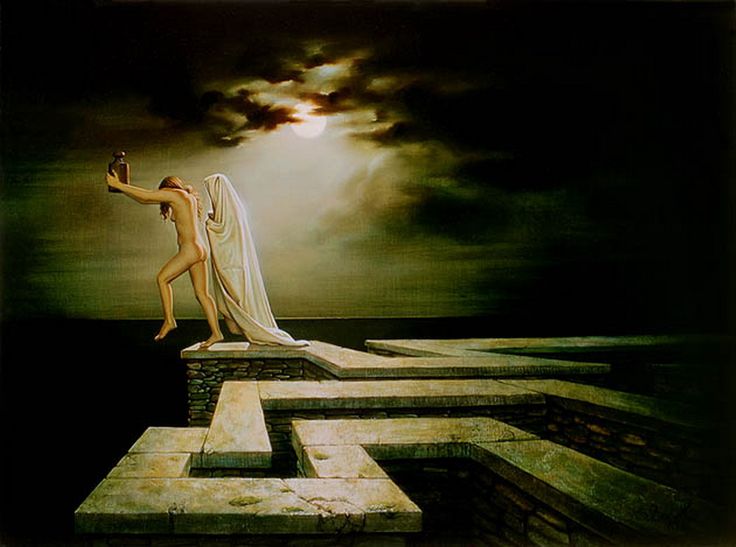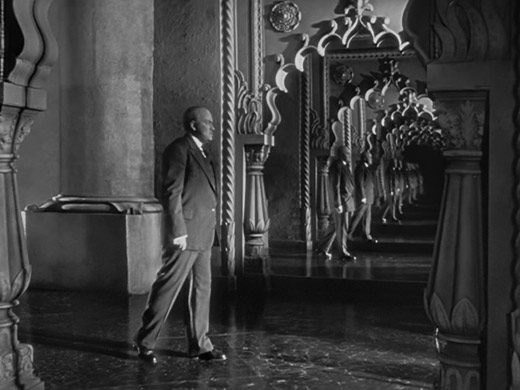Our earth had been scooped-out, scorched into powder and left bare-boned.
Only a changeless backdrop of black sands under a pink-flecked fugue of sky.
The bellows of heaven and earth, pressing together, and heaving great lungfuls of sharp glittering dust across the plains.
The last of us are fated to explore darkly in ships that cannot steer across this dry, but flowing tablet.
This world outside you have imagined many times over, adding layer upon layer of permutations. You test your little compositions with your brothers, adjusting them little by little, until the frieze is ready to be added to the wall, where the glass should be.
You were born on this ship that hovers above the metal rails driven through the sand. It is an island that broke away from the mainland many, many years ago. Your mother remembered the time before the evacuation, but she died just after your fifth birthday. You try to hold her face but it fell into the shadows along with everything else. You have one picture of her. A blank square you carry around in your pocket. Sometimes you rub it gently in between your fingers as if your fingertips could trace her.
On board there are just your two brothers and your cat Charlie. It is 7 am. You instinctively orientate yourself and then calculate the azimuth to walk in a straight line to the wardrobe, sliding back the panel and taking out a freshly laundered uniform. The same routine every day, as a flightless bird might use its compass. The shower drenches you in recycled water for exactly three minutes. Then it blows you dry and you like the feeling on your skin when it gets a little too dry.
You stand in front of the mirror for some time feeling the gentle curves of your face with a physical detachment; is it pretty you wonder? Ultimately this question is meaningless to you. Often you imagine yourself without a head at all, and in its place there is a ball of strobing light.
A low hum and vibration can be felt throughout the ship. It is always there. The ship hovers on electromagnetic fields, moving at a constant speed of ten knots across the railway. Through valleys, through mountains and onwards through the unrelenting desert.
You slide into your uniform and give your hair a quick tousle; it is long and billowing with a slight fringe. You cut the fringe yourself just because. Then you cross to your bed and reach up to the shelf. Your EL-band rests there. Without it the world is under an infinite shadow. The headband is pitted with echo locating transmitters and it fits over your eyes and around the back of your head. It links to implants that have been hardwired into your occipital cortex. The world lights up in electric-blue. You have tried to describe this world to your brothers, but it is undefinable until you swim within it. To you, walking from darkness into this atomic blue light is exhilarating. Every day it leaves you breathless.
Now you can move much more quickly; now you can be agile. Charlie is outside the door. You can hear him bleating in that electronic purr of his. Charlie is a bio-engineered cat. He is one metre tall at least, and equipped with sharp claws and teeth for no reason that you can fathom apart from, perhaps, an artist’s preoccupation with authenticity. He is part organic, part machine. You know he is black, but you see only his impressively arched back when he sits, the texture of his sleek coat and the laconic eyes that blink in electronic darkness. The door slides back and Charlie springs forward and jumps up putting his paws on your shoulders. Then you glide down the steps barefoot, taking a few at a time and you are counting because that’s how you learned to traverse the stairs in darkness.
The spiral stairs descend to the lower levels and the hub of the ship. Around you empty space is criss-crossed by a plasma of semi-organic wires. Crawling along these metallic vines are a seething mass of ant-like droids, all engaged in maintenance and monitoring. They are the ship’s immune system, and constantly test and inspect every part of it –they operate via a hive mind that has been left to evolve unchecked; you once observed them form a series of swaying columns in concentric circles that filled one of the storage bays before dismantling itself after three days. The tower and the viewing station at the top of the stairs poke up and form a broad, rhombus crown. This station houses your bedroom, several workstations and the medical unit.
89 – 90 – 91 –
You both hit the metallic deck and the door slides back automatically. You run into the dining and kitchen area which is one half of the entire level; the other half is the garden. As you cross a new horizon the room is automatically delineated in fiery lines of blue. One entire wall is glass, but to you it is barely different from the other walls. It is a blank slate only your imagination can cross.
Your brothers both sit slumped either side of the table in the middle of the glass wall. A pot of steaming coffee between them and a bowl of green porridge each. Their faces turn and smiles etch into their surface. Those faces are unique geographies that you have traced over and over; lines upon lines gathering into distinct paths, valleys and monuments. They are landscapes within landscapes that you call home.
Hey sis. Come and have some breakfast with us.
You dive under the arms of your younger brother and press your head into his chest. The world to your right goes blank. You feel his warmth enclose you and feel his chest rise and hear his heart counting. Closeness. Safety. Touch.
The coffee smells so good, and you pour yourself a cup. You have just discovered a taste for coffee; suddenly the bitterness and sweet caramel squeezed beneath the gummy walls of your mouth are pleasant tastes associated with mornings and puffy eyes: an adult ritual you have just joined.
Charlie jumps up onto the bench opposite and sits erect; a pose that his animal predecessors would never have adopted. It’s funny and you offer him some coffee and he sniffs it curiously. Brin, your older brother strokes Charlie on the nose.
What can you see? You ask.
Clem strokes your hair and begins to describe the scenery. Although it is usually the same flat expanse, occasionally there is something new. Sometimes they would pass giant fins sticking out of the sand as if some leviathan swam under them, its gills filtering the ash. On rarer occasions they would see one of the new forests that somehow rooted into the sand. Your brothers described them as great fungi with a wide drooping canopy pitched over a single pendulous stem. Once they even saw a fattened mushroom spore and said it was like a million parachutes that flew as gold dust over the black desert once the wind caught them.
But today was different again. Today they were in sight of a maze.
It’s about 10 clicks off. Do you think we should go in?
Yeah, couldn’t hurt. We’ll give it a couple of months and then retrace our route if we’re still lost.
Perhaps we should give it longer? We’re in no rush.
Yeah but I worry about the walls caving in, or the track being damaged.
Maybe. I know you don’t like being in there.
Just seems like the world closes in on you. Every day moving between two walls. I prefer being out in the open.
There might be a city inside. A safe place for us.
You haven’t seen a maze in six years. You spent three months exploring the last one before the track ran out and you were forced to double-back. Your brothers were silent for days after that. They still believe the myth.
In the aftermath of the wars the nations suffered a series of plagues and disasters. It was a time of Gods and Monsters.Chimeric pathogens followed closely on the heels of nuclear bombs and radioactive fallout. The viruses were programmed to distort the body in demonic creations: genetic ergotism led to population collapse. The railway was hastily laid out to connect the last remaining cities.
The desert ships became our arks, sealed up and self-sufficient, unlike our barren planet. As the cities died the ships were sent out to trawl the sands. It was hoped they might find places that had survived and were free from contamination. But many of the cities did not want to be found. In an age without flight the way to lock their doors was to invert the lock and turn it into a landscape. They built huge mazes around themselves with rails and walls. Nothing could get in, not unless it had time, a lot of time, to carefully plot out the maze and find the one path that gave entrance.
In the days when there was still radio contact with other ships a myth grew of a city in the West that was untouched. Your brothers had chosen to believe this myth, perhaps because there was nothing else to believe in and because motion was life; there was only forward.
You scoop down some porridge and enjoy the warmth as it gathers in the pit of your stomach. Here is the centre, a place you cannot see. The EL-band gives a 360 degree image as projected by your brain upon a toroidal screen.
I’m like a bat with eyes and ears all over its head.
What’s a bat? They both retort.
You need to read more books.
We leave that stuff to you; we have a ship to run.
And yes it’s true, they do. The mechanical and electrical parts of the ship mostly take care of themselves but the droids can’t tend the garden, where a nutrient-rich algae is grown out of huge vats. It forms the basis of most meals and if you put your fingers down your throat what comes up is generally more appealing that what went down.
There are several other varieties of plants in the glasshouse that were genetically-modified to both grow faster and produce more seed: varieties of radishes, bush beans and a type of sprout that was planted vertically up one entire wall. There are also larger trees planted here whose main purpose is to help convert CO2 into oxygen in case the biome units fail. The rest of the garden is a sanctuary, planted with the last remaining species in the hope they can one day be propagated into a fertile and forgiving soil outside.
The ship is moved by a silver sail that is several hundred metres high and split into two triangles, each tethered to an ultra-light metal boom. The pyramidal structure swings overhead almost soundlessly to capture the prevailing wind from the East. The outward side of the sail is covered with a fine skin of solar panels, and the base is given over to honeycomb clusters of wind turbines.
Below the kitchen and garden the lower levels contains machinery, generators, supplies and spare parts, a few printers and the housing of the colossal electromagnets which hug the track. You have never been in this level because it carries a greater risk of infection than the upper levels.
You follow your brothers into the garden and Charlie hangs a few steps behind. You enjoy the rich hubris of the air, the humidity and the springiness of the plants under your sweeping hand. You move away from your brothers into the sanctuary, where crystal bees dip in and out of the flower-heads, pollinating them artificially. There are thin paths snaking through the taller plants, the orchard and some of the other crops preserved here. You let your mind wander the space, exploring the exotic forms and delicate movements of the bees.
Charlie pretends to chase them, extending a paw to bat at the humming procession. You think about this strange bell jar you live inside, so different from the jar of light. You describe it this way:
Floating into this thick liquid I feel my head breaking through the surface into a dome carved from blue light. Squirts of neon show objects in a haunted aspect, sometimes giving off smudges of stray luminescence at the edges. The nearer faces are brighter, dipped in white, while the areas that do not answer are impenetrably black. The light is mine, and I feel it whispering from my skin. There is an overpowering detachment from my other senses; it is hard to focus on the compass points normally provided by a body. Forward, in terms of a straight line emerging from between my eyes, becomes an irrelevant coordinate when your brain is processing a continuous image that wraps itself around you. But in order to navigate the bottom of the sea, not to endanger myself, I’ve learnt to orientate my body to the contours of inner-light, the sounds and smells. Now my senses work together, allowing me to walk through the maze without touching the walls.
Your attention is arrested by a particular plant almost hidden under some fig trees. It looks as if it is crouching. The flower head tilts up slowly at you, making you start. It appears to be some kind of orchid, but you don’t recognise the species. You decide to ask your brothers. They are in the production area of the garden and have been checking the plants for signs of disease; they move carefully and bend down close –any disease could prove fatal for all of them. Before you can ask anything Clem is shouting but he is not looking at the plants, he is staring at a screen on the wall. Brin joins him briefly and then they both run into the kitchen. You follow nervously. The kitchen is deserted and you guess that they’ve gone up to the observation deck. You mount the stairs quickly listening to your rising heartbeat.
What is it? Tell me. You say insistently.
We’re approaching the entrance to the maze.
What side is it on? Your imagination places it there, inside.
The left. There’s another ship just past the turning into the maze. It isn’t moving and the sail looks damaged. But that’s not all. There’s a man standing outside, in front of the ship. He’s hung up a sign.
Brin had been looking down at a screen on the panel in in front of him, he made a few deft movements with his hand and then said:
The sign says ‘I have a map’.
Everyone was silent for a few seconds.
What the hell do we do Brin?
He’s outside. He must have the virus.
But he’s alive; he could be immune. We could screen him; then study his immune system. And if he has a map… He let the words hang in the air.
So it was decided. The ship would pause and the sail let out for the first time in twenty years. The man would be let into the decontamination chamber. His blood would be checked by a droid and then tested for the virus. They would then decide what to do.
The only door to the ship, a huge airtight plug, opened out onto the plain at 10.35 am. Your brothers try to narrate what is happening, so you aren’t in the dark, but as he approaches the door their attention is diverted to the screens. He is now in the chamber.
You hear Clem say: His eyes. What’s wrong with them? They’re black. Completely black. He must be blind.
Those words stir you. Your brothers are asking him about the other ship through the intercom: What happened?
You hear him speak for the first time. His voice reminds you of the wind and sand; it is rasped and rough and ragged like his vocal chords are two palm leaves rubbing together.
Ship ran out of power. No food and something wrong with the thingymduds. I dunno about this technical stuff. I thought the Bots took care of that but they left like rats from a sinking ship.
The droids left? I didn’t think that was possible. Says Clem.
Anyone else on board? Asks Brin.
Nope. Rest of ‘em died a long time ago. Just this old man here, blind as a bat.
The console bleeps and Clem runs his fingers over the screen.
He’s clean. I don’t get how but his body shows no sign of the virus.
Sir. You’re not carrying the virus. We’re still going to have to decontaminate the rest of you. Please remove your clothes and give them to the Bot. Then use the shower on your left. We’ll be seeing you in about 30 minutes.
That’s fine son. Just fine.
Brin turns to Clem: When he comes on board I’m going over to the other ship. We need to check out his story but we’ll tell him I’m looking for supplies. If his story checks out I’ll see what we can salvage. I want you to keep an eye on him and ask him to show you the map.
You are eager to meet the old man. This is the first person you have ever met. You can’t tell anything about his eyes, but he walks confidently into the room without stumbling or pausing. Then he takes a long drag on the air and carefully moves to a chair placed out for him in the centre of the room by Clem. Then he raises his head slightly, and sniffs the air. Brin has already left to explore the other ship in a pressurised suit.
There’s someone else here. He says quietly.
That’s just my sister. She’s also blind, like you.
He looks almost towards you and smiles. His form emerges in your mind and your brain fills in the corners it can’t see, even rotates it around for study: he is tall and rakish with hair down to his waist, some of which is in braids. He has beads and other jewellery on both wrists and hanging from his neck; a large stone hangs from a single piece of rope around his neck. There are strange abrasions on parts of his skin in long lines. He is hairless apart from the long locks, and he has rather smooth features for such a gravelled voice.
You sure move around easily for a blind man. Says Clem.
I can see more than you think son. These eyes may be baked out, but I don’t need ‘em. I have my other senses.
Where’s this map you spoke of?
The man reaches down to his satchel which was still wet from the decontamination sprays. He pulls open the main compartment and slides out a huge folded mass of wrinkled and dry paper and unfolds it carefully on the floor. You can’t see what’s on it.
Clem bends down to inspect it. What the hell is this; it’s not paper.
It’s skin. There was a man once who had this tattooed on his back. Story goes that he lived in the city once but was exiled. Before he left he got this put on his back, so he could return one day.
How’d you get hold of it?
It was given me.
Clem eyes him suspiciously.
What’s it got on it? You ask earnestly.
It’s a map of the whole maze. It’s a complex one too. I’ve never seen the designs, but this one could take years to solve by trial and error.
Brin’s voice comes over the speaker. He has reached the other ship and is entering the lower level. He is reporting the power down and no sign of droids anywhere.
No signs of biological contagions here. The virus isn’t present here Clem.
Clem turns on the old man, almost shouting: Why don’t you show signs of the virus? You’ve been outside –it’s in the wind; it’s everywhere.
I think you’ve been cooped up in here too long. It’s been a long time since the outbreak; how long did you think it would last? Anyhow, there’s something else you should be more worried about.
What do you mean?
You’ll see. Go take a look at your garden. Look for a plant like an orchid with a face.
Clem slowly turns to you and locks his gaze. Go upstairs. You too Charlie.
The man falls into a babble, conversing with something or someone, then he stops and says:
Who will inherit the earth? The meek or the snake? He repeats this over and over in a mantra.
Brin’s voice says: I’m in the control room. I’m accessing the log for the last 30 days. There’s something wrong in the garden; I’m going to go back down and check that first. I was hoping we could take their seed-bank.
Now you are climbing the staircase and the voices are obfuscated by the tin-clamour of your feet on the paper-thin metal steps. You rush forward wanting to turn the intercom on in the tower and listen in. When you reach the console and flick it on there is nothing but dark silence. Then there is a screech of metal as a chair is pulled violently across the floor. Then you hear a sound that you didn’t think it was possible for a human to make: an empty howl, inhuman, beastlike; a cry of pain that makes you feel sick and brittle; acid sprays up into your mouth for a second and you bend over and breathe deeply. Was that the old man or Clem? It was hard to tell.
Charlie. You need to go downstairs for me and take a look. When you come back give me a sign that it’s ok.
Charlie trots to the door immediately and then disappears as soon as the gap is wide enough to slip through. You hear him descend for a few steps. Then you wait. Nothing comes over the intercom except a desperate breathing sound, and a faint whimper. You feel helpless. There was no contact from Brin. You try to raise him from the tower but there is nothing. Then there is a loud crash and something slams against the floor. There is a hacking sound. Time passes like skin being pulled through teeth. Ten minutes? Maybe more. Charlie has not returned. You sit on the floor, slip off the headband and try to think in darkness. You need to find out what is happening? If you wait it could be too late? You are quick and aware of everything around you. No one can sneak up behind you. All you need to do is get a few steps into the kitchen and you will see it all.
You quietly leave the tower, and descend as quietly as possible, trying to steady your breathing. You notice that the droids have stopped working. There is an eerie silence permeating the airy space. The doors approach; they will open automatically when you are a certain distance. At that point you need to sprint forward, but at the same time be careful in case he is waiting on the other side. They open and you take a breath and charge forward, head low. As soon as your head passes the jamb of the door the room is alive around you. The old man is standing over your brother and he turns to face you, smiling. Clem is strapped to the chair. Something is growing out of him; something plant-like. It is embedded in his stomach and sprouting many tendrils that are dancing wraithlike in the air.
As you watch, transfixed, it shudders and then tries to burrow deeper and Clem’s head and body arch back into an impossible shape of pain: his entire skeleton snapped back and then doubled over in spasms. On the floor to your right Charlie lays, in two pieces. His head and part of his torso, including his two front legs, has been hacked from the rest of his body. Fluid pools into and runs in rivulets between the floor panels.
Stop. The word barely passes you lips. You try again.
Please. Stop. Why?
It’s not me. These things have their own designs. Creation out of our own neglect and the radiation from the bombs I s’pose. I been watching them for some time and I kinda marvel at it. I even seen a man walk o’er the desert, willed onwards he was, until he lay down and roots burst out of him, down into the sand. Guess I’m just admiring the great tapestry of nature when she’s allowed to reinvent herself.
Please save him; I’ll do anything.
Actually there’s something I need from him first. Something the plants will take if I give ‘em enough time.
His hand comes out of his pocket holding a short knife; you recognise it as one from the kitchen inventory. He bends over Clem and pulls his head back by his hair and then, without pause, slides it into Clem’s eye socket and begins a swift exenteration of the eyeball. After slicing off the eyelid he works fast and methodically around the glutinous parts and muscles. You can’t move and bile is seeping up into your mouth. Then he turns to you and extends his fist towards you while opening his fingers to reveal the eyeball. With his other hand he reaches up to his right eye and gouges out the black pebble inserted there and drops it onto the floor. Clem’s head has flopped back down and blood is streaming onto the floor from the empty cavity.
The old man groans with delight and begins to jump around declaring with glee:
And if thy right eye offend thee, pluck it out, and cast it from thee: for it is profitable for thee that one of thy members should perish, and not that thy whole body should be cast into hell.
You are inching towards Clem, your arms outstretched. You want to take him into your arms, whisper that it will be ok. He will survive this. They will all be together again, a family, sharing the days. You need him; your whole being needs him here. As you stumble forward in this fog, you have not been aware of the old man: your inner vision is all your can hear. But it’s already too late and now you feel the band being slipped off your head; it’s gone and darkness falls and Clem has gone with it. You place your hands on the cold metal floor and feel the grooves. There is a scratch along one side in every panel. You crouch and try to still the gyroscopic spin inside.
Now I have his eyeball I think I’ll take a trip up to that medical unit of yours in the tower and have the droids transplant these organs. They can stimulate and regrow all that dead tissue in this hollow cave. A few nips, some grafting and hey, presto, I got me a new eye. Then I can read that map and take us all to the centre of the maze. We’re all going, one big happy family. ‘Cept Brin of course. The plants over there will be working him over; he’ll be more vegetable than human by now …
Sat in darkness, but tensed and ready, your mind is parlaying between options. That’s when you hear him speak. First it’s just a croak, but the second time it is loud and insistent.
Run!
The scratches in the floor panels were put there by your parents. You used them when you were small to orientate yourself. You spring to your feet and run towards the door. When you hear it open the sound allows you to make a few quick alterations to your course. Then you make four long strides and dive up the stairs. You used to do this as a child; you used to practice. You can do this.
Behind there is a clatter of steps, and then weightier echoes as he chases you. At eighty steps you should hear the door open.
78 – 79 – 80 – 81…
The door clicks and slides back. You hit the top and stumble slightly and then dive towards the left side, feeling for the edge. The old man sounds about half-way up; he is quicker than you expected. Sliding around the opening you feel for the touchscreen. This is the risky part. You quickly brush your fingers across the top to gauge distance. Then you try to tap in the correct code, guessing the distance with your fingers. It beeps an error. He is nearing the top, moments away. You try again and the door hisses and slides shut just as a weight crashes into it from the other side. You slump to the floor with your back to the door while he pounds at it from the other side screaming.
Sadness grips you now, and for a while you succumb to it. Your world has forever changed. And now your life is in danger, Charlie is gone and you don’t know how to save your brothers or if you can save them. For now you are not in immediate danger. The observation deck has water and some rations. The old man can’t get through the door, although he will try and smoke you out. You listen to the ship: sometime soon you should feel it following the rail to the left, turning towards the gaping mouth of the maze.
You are exhausted and decide that some rest wouldn’t hurt. Staggering into the bedroom fatigue ebbs throughout, and so, locking the door behind, you collapse under the duvet, wrapping yourself in the folds like the layers of the maze.
You wake from a fitful sleep at 5 am. The ship would seem to be moving in a straight line: the vibrations are different. You splash water on your face and reassess your options.
Your thoughts are interrupted by a slight tapping sound on the door. It continues unabated. Putting your ear to the metal you get the impression of only a dull thud, insistent and occurring just a few inches from the floor. It doesn’t make sense. The only source you can imagine is a Bot. But why would a Bot be knocking? It could be a trap of course but when the sound doesn’t let up you decide it’s a necessary risk; it could be that Clem has crawled up the stairs and then collapsed outside. You key in the code and flex your muscles, ready to move fast.
As the door opens you are on your knees and are feeling with your hands and listening. Your hands immediately recognise the soft fur and you grab hold of him and pull him across the threshold and then rise quickly to lock the door again.
Charlie. Somehow he got to you. He pulled himself forward with two legs and his head. It took him all night but he ascended one step at a time, never giving up. His electronic purr breaks the silence. Just like your brothers, you have no idea how long he has left, not knowing enough about what is keeping him alive.
Thank you Charlie. I can’t do this on my own.
Then you feel Charlie wriggle as his legs scrape the floor and he scrambles half-heartedly towards the door. Then he stops and you feel his head nuzzle into and then prod you. Then his legs scramble forward again. He’s awkwardly trying to signal an idea. Then his legs wrap around your neck and he hangs down with his head facing forward, upside down. He lightly strokes your neck with an upwards motion and you assume this means walk forward. You do this and he purrs in acknowledgement. Then he taps you sharply with his nose and you stop and again he purrs. Then you feel a slight pressure on your left shoulder and you respond by stepping to the left; then the same on the right.
Ok, I think I got it. Forward, backwards, left and right? We ready to go? I hope so because you’re really heavy; even half of you.
His nose strokes upwards and so you walk steadily forward and key the door code. You wonder then if Clem was tortured in order to try and make him give up that code. It seems likely. The base of the tower is filled with an electronic symphony.
Something has changed again with the droids; they are crackling like a swarm of locusts –you’ve never heard them like this. Something is on the horizon.
Near the bottom of the stairs you pause. Any further and the door will open automatically, alerting the old man. This hadn’t occurred to you until now. As you pause, and consider retreating to the tower, you begin to hear Bots falling to the stairs like metal rain –first it’s just a few then they fall like hailstones. They are surging forward, around your feet, and the door opens anyway. Then you realise that the scraping and din made by their metal pincers is the perfect cover. The old man seems to have a hyper-sensitive sense of hearing, and perhaps smell, but this moving tide should make you invisible.
What the hell is that! You’re leaving too!! You hear him scream.
The droids are in a frenzy and seem to be evacuating the ship; what is it that they sense? Charlie is guiding you forward amidst the swarm. The old man is raving; he must have seen this before. Charlie is tapping to go right, and you assume he means you to hide behind the counter on the right-hand side in the food preparation area. You follow his delicate tapping and your hands grasp the edge of the slab. For a second you almost crouch down behind it, forgetting this won’t make any difference. The droids are streaming down the stairs to the next level.
Where are you going!!! Get back here!!!
He scrambles down the stairs after the horde, shouting and cursing. And then you are on your feet and shuffling your way over to Clem. You wrap your arms around him and kiss his face, but keeping away from his stomach where you can still hear something suckling, gurgling and moving.
Sis. Oh my God you’re alive. I wasn’t sure.
What can I do? Tell me. How can I get this thing out of you?
You can’t. I’m sorry. I’m sorry this happened; it’s our fault. We should have been more careful. Both of us. We love you; we love you so much but it’s time for you to take over. You have to find the city. The virus isn’t the threat anymore: it’s us. Me. Brin too.
What do you mean? I’ll go get Brin. There has to be a way. We can get you up to the medical unit.
No. And don’t go after Brin. Promise me. I don’t want you to see his body; I’ve already seen what will happen to me, what is happening right now. Sis, look at me. Don’t try and fight him. Go outside. Follow them.
I won’t leave you. Your hands begin to shake as you say this.
All parents have to say goodbye to their children one day, and you’re both my sister and the closest I ever came to a child. I watched you grow up strong. Here, take this.
You feel a fist brush past you and you find it and it presses your EL-band into your grasp. You stretch it and pull it on and the world unfurls around you like shoots pushing up into light. Clem strokes your face, following the contours with his rough fingertips.
Keep us alive Sis. You are our future.
He pauses and then says: Charlie, it’s time.
You feel Charlie stretch across and then is a loud, violent snap and you realise with a recoiling horror that he has just broken Clem’s neck. His head goes immediately back to you and buries itself under your chin. Tears gurgle up from within, and your dam breaks; your head flops forward while tears drop and pool into a tiny mirror to trap you in.
Then you hear the footfall behind you and a huge wedge of hatred drives you up onto the balls of your feet. You stand still gently flexing your muscles; there is a confidence rooting you to the spot that was not there before. You sling Charlie further around so that he becomes a sort of backpack, his legs still slung around your neck.
Nice little speech he gave wasn’t it. Very sentimental. Unfortunately these times of suffering call for a harder resolve; we need practical thinking, not emotions. He didn’t quite tell you everything about the virus though, did he? Shall I tell?
…Oh I can’t resist. There were two viruses you see. One of them was programmed to infect men only, and it killed them pretty quick. The other, strangely, only affected women. Made ‘em blind. Funny isn’t it, men we kill, women we condemn. They always been our vessel for sinfulness.
How did you survive the virus?
He cackles and throws his head back and then changes his posture in a way that suggests a different category. Come on. Use some deduction.
You’re a woman.
Ha ha ha. Obvious now isn’t it. And with that she runs her hand over her chest and down to between her legs. Not much of a woman I must admit, but enough to be thankful for the life it’s given.
You do realise killing your brother isn’t gonna help you much. I can take your brother’s left eye and I can get into the medical unit now. I have a special finale planned for you though. There’s something in the garden that’s just dying to meet you.
You watch her move carefully over to the glass doors. He releases them and starts moving backwards. Something sinewy and hulking staggers into the room. It bristles immediately and turns in your direction. Three feet of cleaving root nodules act as primitive feet. Further up its thorny trunk there is a sort of rib-cage of blunt sticks. Above this there is an oily mucous with heart-shaped leaves protruding and then several stalks upon which hang a large serpent-flower. Stamens thrust-out like a mocking tongue, and the head, which looks like a giant gaping mouth, is unfurling into a huge three-point star. It is the orchid you noticed yesterday, but gone through a final metamorphosis into this perverse horror. Tendrils appear out of the wide grin, thin and wavering upon the air. They stretch out towards you, lashing about.
I found out these things love high frequencies. It would love to embrace you.
The leafless sticks at the base begin vibrating against each other and this disrupts your vision by jamming the echo pattern. You can see nothing but interference, a blizzard in the snow globe. Your last glimpse is the plant being about four metres away, swaying now in a frenzied excitement. You stagger backwards and fumble with Charlie. Is there time to use his eyes? In less than twenty seconds you will be cornered. You crouch down and summon your concentration.
The EL-band is set to automatically modulate between high and low frequencies, sending out fixed wavelets, but you can also intervene and manipulate it; it’s tricky and you’ve not been able to master it. You pick out the interference, and then visualise yourself as the wave-mother, calling out to sea. It is a complicated interference pattern, smaller and smaller waves, but they radiate from a single sun. You push the frequencies of the EL-band to the lowest end of the spectrum, and scramble them with their own unique signature. The world flips back into focus, and the approaching silhouette of the plant burns into your vision. Now you can judge the distance perfectly, feel it even as your bathe yourself in the soundscape.
You step back carefully and then circle away from the plant. It pauses again, confused now that you’re sending out lower frequencies. It begins to swivel around on its tripod feet. You defly duck away from and under the tendrils, spinning around as you do this, while your vision remains perfectly orientated. Then you simply face the old woman and walk directly in front of her while she continues to jig around in excitement. She still has the map, and you know she will soon be able to restore her sight; but that is no matter. You remember what Clem said: ‘Follow them’.
You descend the stairs to the lower level. The air-lock is to your left, along a metal gangway. You hear a wail of frustration from the top of the steps as she realises her prey has vanished. Will the plant trap her or does she have a way to control them? Quickly you run to the door and key in the code so that the door swings open and you step into the chamber. It bolts and seals itself behind you and then the outer hatch, the final seal before the outside world rushes in, is released and opens outwards.
You feel warmth on your cheeks and then your forehead, and you taste dry salt on your tongue. Then the wind whips up and sand blasts your face causing your to shield your eyes and ears. The EL-band scans the desert floor, detecting a grainy slate passing underneath which extends outwards to your horizon. You feel like a barnacle, your armour exposed to obliterating forces and inside the brine of your ancestors sloshing about. You slide Charlie back round to the front, and hold him in your arms and caress his head. He purrs.
Ready to go Charlie?
The big cat leans his head forward and licks your cheek. The steps go down beneath you and then stop, suspended some three metres above the earth. It feels as though you about to dive into the abyss. You’ve listened to audio descriptions of astronauts leaving their space stations and free-divers floating down into the murk; and now you are about to leave your home, the terrestrial capsule that reared you in its own private Eden, and insert yourself into an unknown frontier which may not support you. Now you are a spore delivered on the wind.
Rung by rung you go down until your legs are hanging and being jostled by the wind. First you shout to Charlie to let go and you feel his limbs loosen and then the wind takes him. With thoughts of your brothers stinging your eyes you release your grip and the wind throws you further back, and spins you, and for a moment you are flying into this new world arms outstretched. The next sensation you feel is the gravelly slick of sand against your palm and then the hard slump and a painful twist of your limbs as the sand catches you. You lie prostrate and motionless. You hear a bird of some kind wheeling overhead and wonder if it is one of the carrion chasers, keeping one eye on you.
You sit up slowly and without turning, beam your light onto the ship. It is moving away, the reflective surfaces making it an obscured mountain passing across your horizon and into the night. Then it is just noise, the hum of electromagnetic field generators and the coiling sound of the track.
Charlie!!
Nothing. Fear jolts you.
Charlie!! Please, Charlie!!
You stagger around in circles, firing out pulses in all directions and hoping something comes back. Then there is a form sprawled out; the fur muffles the echo, and you see a kind of black sinkhole in the blue sky of the floor. Running in choking strides and then he is there below you. You scoop him up and bury your head into the soft warm fur; he is the last of your former life, your friend, your mirror. He wriggles slightly and you hold his body up so his head is level with yours: his seeing eyes opposite your unseeing eyes. His mouth opens. He yawns. He blinks. You hold him close and feel his purring.
Thank God you’re ok. I don’t know what …. You let the sentence trail in the wind.
Swinging Charlie over your back you head in the direction of the ship in order to follow it into the maze. You put your hand against one of the vast feet supporting the track above you, and walk along, keeping one hand ahead of you through the sandstorm. Your world has been reduced to these two featureless surfaces: the metal feet that appear at intervals on your right and the flat expanse of the desert in every direction under your feet. Every time the wind rings over the flat terrain your mental image is torn up and thrown into a hall of mirrors.
The stinging winds rise and fall in tides, and your feet beat out the time. Your visible world is so diminished that you decide to take off the EL-band and follow the rail. Then a sound you don’t recognise seems to reach you through the howl of the wind; it seems to be in front of you. As you get closer you recognise the bleeps and crackle of the droids. Are they waiting for you?
When you get closer they swarm around you and the clicking and bleeping heightens. You wonder how Clem knew what to do. Was it just a theory? What happens now? As you crouch down and feel around you, tracing the various abdomens and thoraxes of this motley crew, recognising some but unsure about others (are they from the other ship?), you feel something being pushed into your hand. You realise it’s a bottle of water, and then a packet of rations is being offered to you by another Bot. Then they start making a racket again and begin to totter off towards the maze.
You follow in a stupor, trying to figure out what this means. At the edge of the maze they pause and become silent. You approach and they part allowing you through. You take out your EL-band and place it over your eyes. Featureless concrete walls disappear out-of-sight upwards, to either side and in front of you. The huge rail continues forwards. Ahead you can hear the ship making a sharp turn to the left, and the huge boom poles supporting the sail are swinging around to capture the wind, giving out a singing high-pitched tone. You walk forward into the cool shade of the maze and stop. The inner walls are covered in strange crenulated fungi, and at that moment fronds flap outwards and shake off wisps of pollen that are immediately carried up on the rollercoasting winds. What next?
It is impossible to navigate the maze. Even if you had the map you wouldn’t make it –it could take months or even years; you have no idea how far it is to the centre. But where else could you go? Perhaps there was a life to carve-out in here? Could you live off the organic matter encrusted on the walls? It seemed doubtful, but you would have to try. You walk forward again, and focus your beam forward, seeking out the forking path. It eventually replies, and a fuzzy definition emerges from the blank square in front. As you scour it for information something irregular jumps out at you. You concentrate harder, sending batches of modulating pulses. There is something rectangular set into the wall.
When you reach it you brush aside the fronds and hanging vines. The rectangle is vertical, and when you touch it you feel cold metal. Then the answer hits you. Your hands move outwards in sweeping arcs and eventually find a handle. It’s rusty and it takes several attempts but eventually it moves and the door creaks open. You leave it open for the droids and walk through. You emerge into another path of the maze, running in both directions. Directly opposite you is another door, the same as the first. You walk under the rail and open it. And after this door there is another, and another, and another. After walking for several hours a thought occurs to you: this is the solution to the maze. The maze is a fortification against the sand and infection and attack; and also a way to keep the ships from ever reaching the city. The only way to get there is on foot. Because the virus takes between 48-72 hours to kill, anyone who walks to the centre must be…
And the solution again strikes you for it providence. The only ones who can reach the centre are women, delivered by the ark and chosen by the systems on board. They must travel, blind and on foot: pilgrims of a new age. You laugh out loud at this realisation. The old woman is doomed to wander the maze and her map is a worthless rune. The maze is in fact a labyrinth: an endless journey designed to obscure its centre. The true path is hidden behind a myth that mankind keeps telling itself: to go forward, to survive, to reproduce and pass on our selfish genes.
How far you have to walk now is unknown. But you have only to keep walking, one foot in front of the other in a straight line. Days and nights mean nothing to you. The droids occasionally pass you food and water, and you stop frequently to check on Charlie; ensure that his power source is still keeping him alive.
On the fourteenth day the door opens onto a grassy plain and the first thing to hit you is the smell. You have listened to descriptions of grass and lawns. It captured your imagination and you listened to encyclopaedic entries, descriptions of paintings and Walt Whitman. In your mind’s eye it might be more beautiful: the blue sea on which you stand that peels back and bows under the wind in thousands of breaking waves. Your sight scans forward, but only sees more grass flickering downwards into a large circular valley. Tired and on cracked and bruised feet you summon the strength to carry on.
In the distance a bell tolls and then more bells erupt in the distance. Is this an alarm? The droids continue to follow like geese and Charlie tries to turn his head to face forward, his large head pushed under your armpit. Is there life here? Will you finally be safe?
Perhaps sensing the end of the journey your knees buckle and you sink into a posture of benediction. You surrender to it and lean forward to sniff the grass. It is so soft and fresh; you can’t remember smelling anything like this, even in the garden. It is wondrous and seems to trigger some deep genetic memory inside; you feel like you have crawled back inside your mother’s womb and everything that has sunk will float again. The world will not exist; you will not be born; there will be no end, only a forever beginning. And then you hear a voice, and hear feet flattening the swaying grasses.
There are several voices, all muffled. The droids come to a halt near you. You pull Charlie up so that his head is next to yours, and you kiss his face and put your nose on his. The feet have stopped, and then one pair comes forward. Charlie is partly blocking your vision, but you don’t worry. You have surrendered to the wind. Then there is a single voice, a woman. It is warm and kind. You hand reaches for the picture of your mother and you hold it tightly. The voice repeats itself.
You will be alright now. We’ll look after you. What’s your name?
You stay silent for a while, wanting to sink into the grass, let it swallow you whole. Then something brings you back; a face. A face you thought you had lost. You float back up to the surface.
Selina. My name is Selina.
We’re very happy to have you here Selina. It’s been a long time since anyone found us; we had almost given up hope.
Are you all women here?
Yes we are. We might be the last that’s left.
But if that is so, we are doomed.
The droids erupted then into one of their symphonic choruses. Were they communicating something?
Maybe not Selina. You are a very special visitor. There is something I ought to tell you now although there are many things that need explaining. Selina, it is no accident that you have come here. It was planned, in a sense. You are pregnant.
You sit bolt upright and your eyes open wide; a reflex action, despite its lack of utility.
That’s impossible.
It’s not, believe me. The ships sent across the desert have an ulterior motive. They were intended to save the last healthy females so we could start again. When the ship came within range of the maze the droids waited for the right moment to inseminate you. You would have been drugged one evening, and then during your sleep had your eggs fertilised. It is rather unpleasant I know, and done without your permission. The fact that women are accustomed to being vessels doesn’t make it right. But it was done and the survival of our species may rest on you, and others like you that may still be out there combing the desert.
But who then is the father?
Your eggs will have been fertilised with your own chromosomal material. Our race is currently limited to a form of asexual reproduction.
Would my brothers have known about this?
No. This would not have been disclosed to anyone on the ship, although it’s possible your mother knew and signed the papers.
Emotions are forming deafening waves inside, but strength resides there too; walls to resist the impact. You pull yourself to your feet and face the colony. The future may lay wide and open before you, but you can’t see it. The wind blows gently through your hair and you gather yourself into an arrow. You will survive, no matter what.
First things first … I need you to fix my cat.
